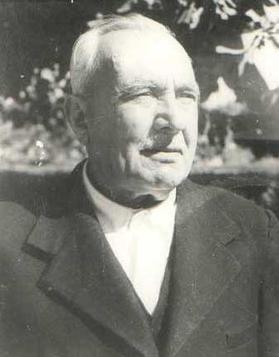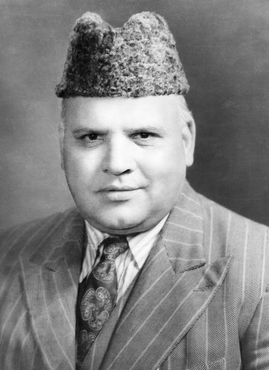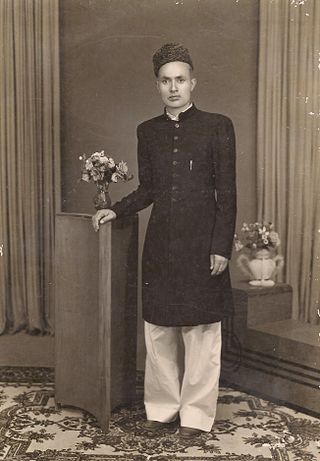
Pashtunistan is a region located on the Iranian Plateau, inhabited by the indigenous Pashtun people of southern Afghanistan and northwestern Pakistan, wherein Pashtun culture, the Pashto language, and Pashtun identity have been based. Alternative names historically used for the region include Pashtūnkhwā (پښتونخوا), Pakhtūnistān, Pathānistān, or simply the Pashtun Belt.

Abdul Ghaffār Khān, also known as Basha Khan or Badshah Khan was a Pashtun independence activist, and founder of the Khudai Khidmatgar resistance movement against British colonial rule in India.

Khan Abdul Wali Khan was a Pakistani democratic socialist politician who served as president of Awami National Party. Son of the prominent Pashtun nationalist leader Abdul Ghaffar Khan, Wali Khan was an activist and a writer against the British Raj like his father.

Asfandyar Wali Khan is a Pakistani politician from Khyber Pakhtunkhwa who is the president of the Awami National Party (ANP). His father, Abdul Wali Khan, was the party's first president. He is the grandson of Abdul Ghaffar Khan, better known as Bacha Khan; Abdul Ghaffar was the founder of the non-violent political movement in NWFP, Khudai Khidmatgar during British colonial rule in India and a companion of Mahatma Gandhi. Asfandyar's Granduncle Khan Abdul Jabbar Khan was the Indian National Congress's Chief Minister of the North West Frontier Province, during the waning days of the British Raj, and also the Chief Minister of the province during the early days of independent Pakistan. Asfandyar is the present president of the Awami National Party and has served as Member of Provincial Assembly of Khyber Pakhtunkhwa, Member of the National Assembly of Pakistan and senator in the Senate of Pakistan. Asfandyar Wali Khan got credit of provincial autonomy in Pakistan and the renaming of North West Frontier Province as Khyber Pukhtoonkhwa with support of coalition partner PPP during 18th amendment 2010.

Khan Abdul Ghani Khan was a Pakistani Pashto language philosopher, poet, artist, writer and politician. He was a son of Abdul Ghaffar Khan, a prominent British Raj-era independence activist. Throughout his life as a poet in both British India and Pakistan, Khan was known by the titles Lewanay Pālsapay and Da īlam Samander.

Ajmal Khan Khattak was a Pakistani politician, writer and Pashto language poet from North-West Frontier Province, who served as the President of Awami National Party. He was a close friend of Khan Abdul Wali Khan.

Swabi District is a district in the Mardan Division of the Khyber Pakhtunkhwa province in Pakistan. It lies between the Indus and Kabul Rivers. Before becoming a district in 1988, it was a tehsil within the Mardan District. 96% of the population speaks Pashto as their first language.

Khan Abdul Jabbar Khan, popularly known as Dr. Khan Sahib, was a pioneer in the Indian Independence Movement and later, a Pakistani politician. He was the elder brother of the Pashtun activist Abdul Ghaffar Khan, both of whom opposed the partition of India. Upon independence, he pledged his allegiance to Pakistan and later served as the First Chief Minister of West Pakistan.

Khudai Khidmatgar was a predominantly Pashtun nonviolent resistance movement known for its activism against the British Raj in colonial India; it was based in the country's North-West Frontier Province.

Khan Abdul Qayyum Khan Kashmiri was a major figure in British Indian and later Pakistan politics, in particular in the North-West Frontier Province, where served as the deputy speaker of the provincial assembly, first Chief Minister of North-West Frontier Province and served as Interior Minister of Pakistan in the central government from 1972 to 1977.

The Qissa Khwani massacre in Peshawar, North-West Frontier Province, British India on 23 April 1930 was an armoured vehicle-ramming attack and mass shooting of the unarmed civilian freedom fighters by the British colonial troops, which consequently became one of the defining moments of the independence movement in British India.
The Babrra Massacre was a mass shooting on 12 August 1948 in the North-West Frontier Province (NWFP) of Pakistan. According to official figures, around 15 protestors were killed while around 40 were injured. However, Khudai Khidmatgar sources maintained that around 150 were killed and 400 were injured.
Arbab Sikandar Khan Khalil (1911–1982) was a Governor of the Khyber-Pakhtunkhwa province of Pakistan. He was a senior leader in the National Awami Party, which won the 1970 elections in Khyber-Pakhtunkhwa and Balochistan and later formed the provincial governments. He was dismissed as Governor in 1973 and subsequently arrested as part of the Hyderabad tribunal. He was released in 1979 and was assassinated in 1981.
The Bahram Khan family is a major political family from Charsadda, Khyber Pakhtunkhwa province of Pakistan.

Pashtun nationalism is an ideology that claims that the Pashtuns form a distinct nation and that they should always be united to preserve their culture and homeland. In Afghanistan, those who advocate Pashtun nationalism favour the idea of a "Greater Afghanistan", which includes Khyber Pakhtunkhwa, and be ruled directly under Pashtun principles.
Different Muslim movements through history had linked pacifism with Muslim theology. However, warfare has been an integral part of Islamic history both for the defense and the spread of the faith since the time of Muhammad.

Khan Roshan Khan Yousafzai was a Pashtun historian, educationalist, and writer from Pakistan known primarily for being president of the Muslim League in Swabi and for writing books on the history of the Pashtun people.
The Bannu Resolution, or the Pashtunistan Resolution, was a formal political statement adopted by Pashtun tribesmen who had wanted an independent Pashtun state on 21 June 1947 in Bannu in the North-West Frontier Province (NEFP) of British India. The resolution demanded the British to offer the option of independence for Pashtunistan, comprising all Pashtun territories in British India, rather than choosing between the independent dominions of India and Pakistan.

The North-West Frontier Province referendum was held in July 1947 to decide whether the North-West Frontier Province {Now Called Khyber Pakhtunkhwa} of British India would join the Dominion of India or Pakistan upon the Partition of India. The polling began on 6 July and the results were made public on 20 July. Out of the total population of 4 million in the NWFP, only 572,798 were eligible to vote, of whom only 51.00% voted in the referendum. 289,244 (99.02%) of the votes were cast in favor of Pakistan and only 2,874 (0.98%) in favor of India.
Abdul Aziz Khan Kaka (1906–1987) was a member of the Khudai Khidmatgar Movement from Zaida Kallay, Swabi who defeated the Imperial Crown's Political Agent, Sir Sahibzada Abdul Qayyum Khan in the elections of 1936.













